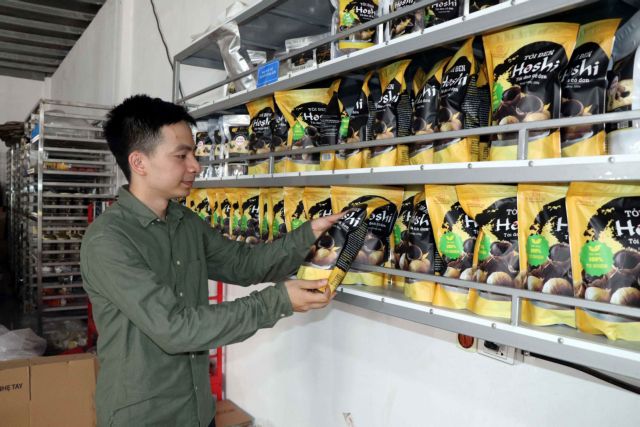Yên Châu District has about 200 hectares of garlic with an estimated output of 400 tonnes.

The northern province of Sơn La is developing its economy through the production of Yên Châu black garlic with Japanese technology.
Yên Châu District has about 200 hectares of garlic with an estimated output of 400 tonnes. There are many types of Yên Châu garlic, with purple garlic the most common. In addition, there is the single-clove garlic with higher economic value.
With a fairly large single-clove garlic output, the Tuổi Trẻ March 26 Cooperative in Yên Châu District has applied Japanese technology to produce black garlic from the natural fresh single-clove garlic.
Every year, the cooperative sells about 10 tonnes of black garlic, earning about VNĐ4 billion (US$167,800). Yên Châu black garlic products are also developed to achieve the four-star standard in the One Commune One Product (OCOP) Programme.
Nguyễn Văn Tuấn, director of Tuổi Trẻ March 26 Cooperative said: "In the first phase, cooperative members faced many difficulties because they did not have capital and production techniques."
The cooperative has invested in modern factories and production lines.
In particular, the cooperative focuses on improving quality to build the "Hoshi Black Garlic" brand, ensuring strict requirements to export to other countries in Southeast Asia.
Purple garlic is a popular winter crop in Chiềng Đông, Chiềng Sang, Chiềng Pằn and Viêng Lạn communes of Yên Châu District, Sơn La Province. Garlic is harvested from the end of January to the end of March.
Yên Châu District has six OCOP products with three-star and four-star certificates, including Yên Châu black garlic. Other OCOP products are crispy banana, flexible dried banana, flexible dried mango, and yellow turmeric starch.
The cooperative will continue to build raw material areas for garlic, as well as share their experiences in farming in the direction of clean and environmentally friendly agriculture.
It also expects to focus on processing and preserving local products, such as dried mango, banana wine, mango wine, and plum wine.
In recent years, to enhance the value of local products, Yên Châu District has promoted guidance and support for production establishments in applying advanced science and technology to the production process.
At the same time, the district has actively supported the households in participating in the OCOP programme.
Lại Hữu Hùng, deputy head of Yên Châu District's Department of Agriculture and Rural Development, said many farmers, businesses and cooperatives had increasingly focused on improving the quality of agricultural products, gradually building brands, expanding markets and joining e-commerce trading floors.
From the successes in implementing the OCOP programme, many local traditional products had met market demand and improved in terms of quality. — VNS





